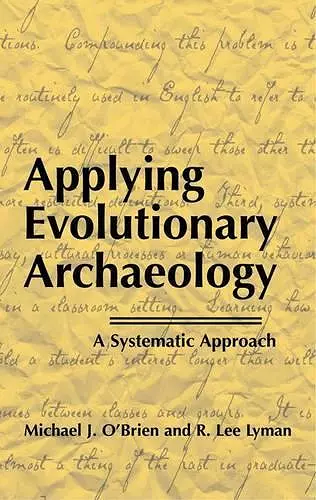Applying Evolutionary Archaeology
A Systematic Approach
Michael J O'Brien author R Lee Lyman author
Format:Paperback
Publisher:Springer Science+Business Media
Currently unavailable, and unfortunately no date known when it will be back
This paperback is available in another edition too:
- Hardback£129.99(9780306462535)

Springer Book Archives
After one of the preeminent (and often vilified) social scientists of the nineteenth century, Herbert Spencer, popularized the term in the 1850s, evolution became more or less a household word, usually being used synonymously with change, albeit change over extended periods of time.Anthropology, and by extension archaeology, has had a long-standing interest in evolution in one or several of its various guises. Pick up any lengthy treatise on humankind written in the last quarter of the nineteenth century and the chances are good that the word evolution will appear somewhere in the text. If for some reason the word itself is absent, the odds are excellent that at least the concept of change over time will have a central role in the discussion. After one of the preeminent (and often vilified) social scientists of the nineteenth century, Herbert Spencer, popularized the term in the 1850s, evolution became more or less a household word, usually being used synonymously with change, albeit change over extended periods of time. Later, through the writings of Edward Burnett Tylor, Lewis Henry Morgan, and others, the notion of evolution as it applies to stages of social and political development assumed a prominent position in anthropological disc- sions. To those with only a passing knowledge of American anthropology, it often appears that evolutionism in the early twentieth century went into a decline at the hands of Franz Boas and those of similar outlook, often termed particularists. However, it was not evolutionism that was under attack but rather comparativism— an approach that used the ethnographic present as a key to understanding how and why past peoples lived the way they did (Boas 1896).
`This book will repay reading and patient study by any archaeologist or student who hopes that his or her efforts will add to the store of human knowledge but may not be sure how to make that happen.'
Journal of Anthropological Research, 57 (2001)
ISBN: 9780306462542
Dimensions: unknown
Weight: unknown
471 pages
2000 ed.